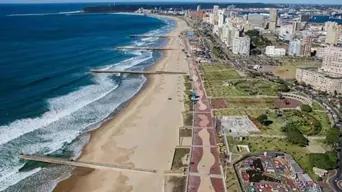YONELA DIKO: Agriculture, infrastructure and local economy integration keys to KZN's economic growth
KwaZulu-Natal is primely positioned to help accelerate intra-Africa trade, however, it must urgently address standing challenges in order to achieve this, and by extension help fulfil the 2063 dream of the Africa we want, writes Yonela Diko.

Over the last 30 years, KwaZulu-Natal has had a remarkable and impossible journey.
The African National Congress (ANC) government turned a province known for violence and war into a significant economic player on the continent.
The work put in, especially in the early years of democracy, ensured an end to political and ethnic violence, giving the province enough stability and space to begin to rebuild.
As the Premier of the province, Nomusa Dube-Ncube, delivered her State of the Province Address on 28 February, she expressed pride at what had been accomplished during her short tenure, and by her predecessors.
READY FOR INTERNATIONAL TRADE
Even as one moves around various economic centres of the province, it's clear that this is a lion on the move.
The province's supply chain infrastructure is commendable - from the Dube TradePort Special Economic Zone to the King Shaka International Airport, which is directly connected to more than eight international destinations, feeding into the various distribution centres and transport management systems in different parts of the province.
KwaZulu-Natal is also the closest coastal province to the country's economic hub, Gauteng. This makes its ports the busiest in the country as tonnes of goods move along the N3 corridor for the coastal ports.
As a result, the port of Richards Bay is responsible for handling almost 60% of the country's cargo tonnage, and 4% of the global export of aluminium happens there.
The province also produces over 50% of all timber in the country, as well as some of the largest sugar cane process plants, both of which are exported via ports.
It is this infrastructure already handling much of the global trade that gives the Premier great confidence that the province and country are ready for an acceleration in international trade, particularly the fast implementation of the African Continental Free Trade Area (AfCFTA).
CHALLENGES AHEAD
The challenges surrounding Transnet are well understood. It’s not enough to restore Transnet to its pre-crisis levels, but to double down on state-of-the-art electronic systems at ports, to double the efficiency of customs as volumes multiply. This is important for the acceleration of trade, along with better physical infrastructure.
The province must also work hard to eliminate non-tariff barriers. This will boost our intra-trade with the continent and the rest of the world.
KZN has three African countries bordering it, namely Mozambique, Swaziland, and Lesotho – an advantageous geographic dividend in the process of intra-Africa trade.
Mozambique, Botswana, Namibia, Zimbabwe, and Zambia are the main destination markets for South Africa’s intra-African exports, importing 67% of South Africa’s intra-Africa goods and services.
In this regard, we must also strengthen our open borders, and take advantage of increasing African trade as the province is strategically positioned to help accelerate intra-Africa trade.
AREAS OF FOCUS
There are three main areas of focus I believe KZN must focus on and give impetus.
The first area is agriculture. The rural economy has huge potential waiting to be unlocked. And yet, there remain huge tracks of uncultivated but arable land.
The second area is infrastructure investment. Despite the impressive infrastructure already in place, there remains a significant infrastructure backlog. Without infrastructure, intra-Africa trade will remain a dream
The third aspect is deepening integration of our local economies through dealing decisively with issues of rail, to ease the load on our roads, and increase tonnage into various destinations.
South Africa has a lot to offer the world, including light oils, bituminous coal, ferrochromium, chromium ores, electrical energy, goods, vehicles, and non-agglomerated iron ores, with KwaZulu-Natal already exporting much of these.
There is plenty of room to grow incrementally to fulfil the 2063 dream of the Africa we want.
Yonela Diko is the former spokesperson for the ANC in the Western Cape.